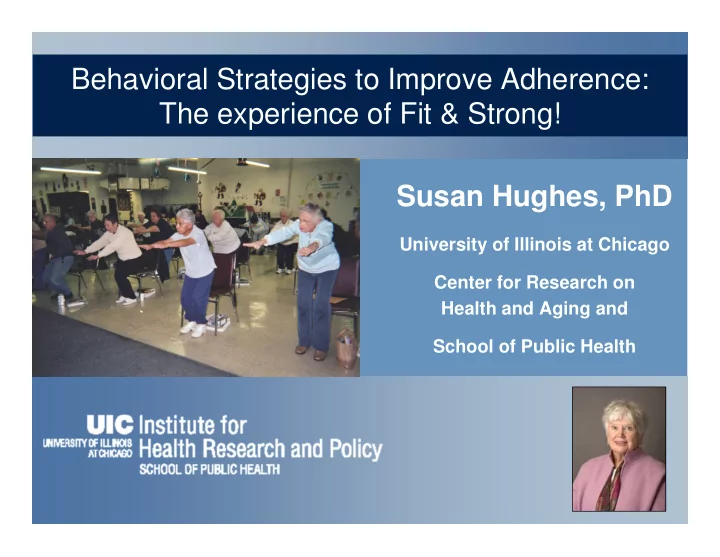

Behavioral Strategies to Improve Adherence: The experience of Fit & Strong! Susan Hughes, PhD University of Illinois at Chicago Center for Research on Health and Aging and School of Public Health
Goals of Presentation: 1. Review Fit & Strong! (design, components) 2. Describe Social Cognitive Theory (SCT) 3. Demonstrate how Fit & Strong! used SCT to improve adherence over time Advancing Health Practice and Policy through Collaborative Research
Fit and Strong! Advancing Health Practice and Policy through Collaborative Research
Why We Developed Fit and Strong! • Earlier prospective, longitudinal study of 600 older adults in Chicago (GeriMAC) • Supported by NIAMS, NU MAC • Findings: • Arthritis is the number one cause of disability • Lower extremity joint impairment, in particular, is a risk factor for future disability (Dunlop, Hughes et al.,1998) – classification tree analysis Advancing Health Practice and Policy through Collaborative Research
Osteoarthritis (OA) and Exercise • People with OA have decreased aerobic functioning and decreased muscle strength compared to age- matched controls (Minor et al.,1989; Semble et al., 1990). • Decreased activity due to pain leads to de-conditioning. • Indicates exercise interventions must encompass • flexibility, • aerobic conditioning, and • strength training Advancing Health Practice and Policy through Collaborative Research
Critical role of John Allegrante • Kovar, Allegrante, Mackenzie, Peterson, Gutin, & Charlson (1992): • Strength training and walking program for lower extremity OA • 12-week program; strong outcomes In design phase, contacted Allegrante – how achieve long term impact? His advice: include health education component, directed at adherence Advancing Health Practice and Policy through Collaborative Research
To Maintain Activity Over Time, Adherence Literature Suggests: • Include education component geared to increasing self-efficacy • Self Efficacy: • Confidence that you can perform a task • Belief that if you perform it, you will achieve a personally meaningful outcome (Bandura,1977,1982) Advancing Health Practice and Policy through Collaborative Research
Fit & Strong! Lifestyle Change = Exercise + Education • Can’t just tell people to exercise and teach them how • Need to review what exercise means to them in context of their lives • prior experience • concerns about safety • facilitators and barriers • problem solving Advancing Health Practice and Policy through Collaborative Research
Fit & Strong! Program Components • Multiple component physical activity / behavior-change program for older adults with lower-extremity pain and stiffness • 8-weeks • 3 sessions per week, 90 minutes per session � First 60 minutes = physical activity � Last 30 minutes = group discussion / problem solving • Implemented and evaluated in community-based settings, tested through efficacy, effectiveness, and dissemination trials, and has achieved significant outcomes, being offered in 6 states Advancing Health Practice and Policy through Collaborative Research
Bandura 1989, 2001 Perceived self-efficacy Outcome Expectations •Physical activity logs •Negotiated contract •Realistic goal setting Goal Setting •Negotiated contract •PA maintenance goals Normative Fit & Strong! Influences / Barriers and Modeling Facilitators •Peer modeling •Problem solving •Group discussion •Addressing barriers Knowledge •Group discussion •Education / group discussion •Structured 24 session curriculum Advancing Health Practice and Policy through Collaborative Research
Participant Adherence Contracts • Week 6 of the program: participant and instructor meet to develop negotiated adherence plan • Each adherence plan incorporates: flexibility aerobic strength exercises • Plan is a signed contract for post Fit and Strong! maintenance Advancing Health Practice and Policy through Collaborative Research
Fit & Strong! Completed Research • Efficacy Trial: Tested safety and efficacy • Effectiveness Trial: Tested effectiveness and maintenance • Dissemination Study: Test implementation and dissemination across heterogeneous group of settings and geographic regions Advancing Health Practice and Policy through Collaborative Research
Fit & Strong! Efficacy Trial Randomized Controlled Trial assessed impact on: • Lower extremity disability, pain and stiffness (WOMAC) • 6-minute distance walk (surrogate for aerobic capacity) • Sit-stand test (lower-extremity muscle strength) • Self efficacy for exercise, exercise adherence, and arthritis management • Exercise participation at 2, 6 and 12 months Advancing Health Practice and Policy through Collaborative Research
Significant Outcomes Favoring Treatment Group (N=215) �������� �������� ��������� ��������� ��������� ��������� ��������������� ��������������� ��������������� ��������������� ��������������� �������� �������� ���������������������� ����������� ������������ � ��!���������� � ��!����������� � ��!����������� ������������ � ��!����� "���#�$������� "���#�$������� ������������ Advancing Health Practice and Policy through Collaborative Research
Fit & Strong! Efficacy Study Effect Sizes ��������������� �������� �������� ��������� ������������� �������� ���� ���� ���� �������������� ���� ���� ��������������� ���� ����� !"� ���� ���� ���� #$" % ���� ���&�� ��������� ���'' ���'�� ����� (������� ����������������������� ���� ����� ���� Advancing Health Practice and Policy through Collaborative Research
Fit & Strong! Effectiveness Trial • 2003-2008, funded by NIA to test different ways of reinforcing maintenance of PA after Fit and Strong! ends • Added 536 older adult participants • Replicated in 7 Chicago Department on Aging Senior Centers • Outcomes assessed at baseline, 2, 6, 12, and 18 months Advancing Health Practice and Policy through Collaborative Research
Effectiveness Trial Significant Effects: Physical Activity Maintenance (N = 486) �������� �������� ��������� ��������� �������������������� �������������������� �������������������� ���� ���� ���� �������������������� ��������� !��"����#����������� !��"����#����������� !��"����#����������� !��"����#����������� !��"����#������� !��"����#������� !��"����#������� !��"����#������� ��������� ��������� ��������� ��������� Advancing Health Practice and Policy through Collaborative Research
Other Significant Outcomes (N=486) �������� �������� ��������� ��������� $����������� $������������ $������������ $������ $������ $������ $����#������!������� $����#������!������� $����#������!������� $���������� $���������� )�������*�� ��%����# ��%����# ��%����# "�+����� &���������� &���������� ������# ������# ������#� ������# &���������'������#� &���������'������# &���������'������# &���������'������# Advancing Health Practice and Policy through Collaborative Research
Recommend
More recommend